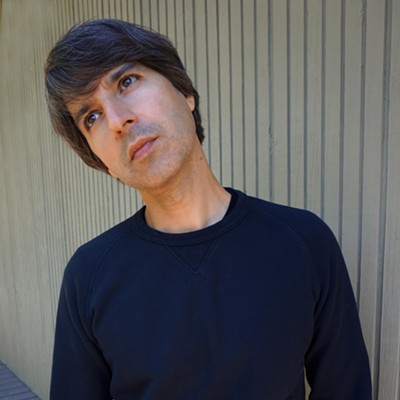What if an astronomer told you that astronomy has little to no practical value? Or that while the big bang was the beginning of our universe, our universe may have no beginning?
Those are just a few of the conundrums that speakers and audiences will address over the next six weeks during the "Cosmic Origins" lecture series.
Put on by the UA College of Science, the weekly series will feature guest speakers taking on questions from the big bang and black holes to dark energy and God's role.
"One of the greatest mysteries is how our universe was formed," said Joaquin Ruiz, dean of the UA College of Science. "Our responsibility is to educate our community at large, not just the students."
Just through the language and the scale involved in talking about astronomy—think about light years and time measured in billions of years—the lectures are bound to make some people realize how small their lives really are, said Christopher Impey, the college's academic head of astronomy.
Because of the mass scale of the universe and humans' tiny life spans, almost nothing in astronomy is of practical value to people, he said.
So why study astronomy at all?
"It's built into us to be curious," Impey said. "It's the same curiosity that took us out of Africa and spread us around the world."
Besides causing audiences to question their own significance, the series will also challenge lecture-goers to let go of some of what they think they know about the laws of nature. Out in the far reaches of the universe, the laws of physics as we know them do not always apply. For example, it is widely accepted throughout the scientific community that the big bang was the beginning of the universe. However, time may not behave everywhere as it behaves on Earth, especially considering the possibility that there may be multiple dimensions outside of our familiar three-dimensional system. As a result, the universe may have no beginning, Impey said.
Lost yet?
The laws of physics, and Albert Einstein himself, tell us that nothing can travel faster than the speed of light. If that is true, then the age of the universe and its size should be reflected within the same number. Yet, the universe is an estimated 13.7 billion years old ... and 92 billion light years across.
The reason? It's just another example of astronomy not following the rules. In the moments immediately following the big bang, the universe was actually expanding faster than the speed of light—a perceived impossibility, according to Einstein's theory, Impey said.
"That's actually not really against Einstein's theory," he then said.
Wait, what?
"We're dealing with some interesting stuff here," Impey added. "People can get more at the lectures."
What about the possibility of life elsewhere in the universe? Extraterrestrial life isn't out of the question, right?
"Astrobiology (the study of life in the universe) is an exciting frontier subject. There is so much space out there, it would be amazing if we were alone," Impey said. "That's the way most astronomers think about it."
If life is found outside of the confines of Earth, it will likely be in the form of microbes and micro-organisms, which can live in extreme conditions, Impey said.
Previous themes for the College of Science's lecture series include "Mind and Brain," "Global Climate Change" and "Evolution."
"Each year is a different flavor of science," said Bo Baylor, a co-coordinator of the series.
The college has continually upgraded the venues for the series. When the series began, it was held in a 300-seat auditorium. Now, the series regularly draws 1,500 spectators or more at the UA's Centennial Hall.
Impey admitted that "it's pretty darn unusual to have so many people attend a university's public lecture series." He thinks this year's series will be popular because of astronomy's ability to transport people away from their everyday worries—and put those worries into perspective, if only for a short time.
"It reminds us that there's something else out there," Impey said.
The first talk in the series, on Feb. 1, will focus on how unscientific influences and assumptions shape ideas in science and astronomy. Led by Guy Consolmagno, an astronomer for the Vatican Observatory, the lecture will touch on topics concerning the direction astronomy takes when affected by surrounding cultures.
"Science progression is molded by culture and even religion," Impey said. "Science is a broad cultural pursuit, so scientific ideas are a consequence of the culture."







